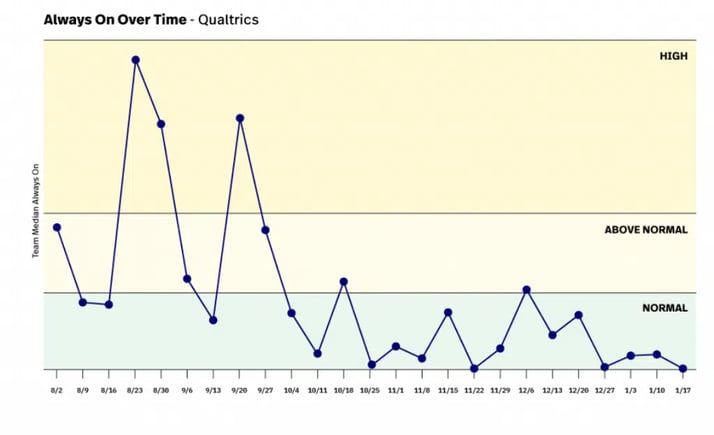An engineering team at Qualtrics made it their mission to understand why everyone was feeling overworked and what actions they could take to help. Using Uplevel metrics, they were able to measure the impact of changes they made to work better together without burning the candle at both ends.
The Problem: Dwindling Engineer Engagement
Qualtrics is an experience management company that provides cloud-based software to help over 13,000 customers measure and improve the experiences for their own customers downstream. Following the transition to remote work in 2020, Qualtrics sought out tools to bolster team effectiveness and ensure software engineering teams were able to maximize their time and velocity — while still prioritizing the experience of developers. That’s when Qualtrics found Uplevel.
Rohit Ramesh, an engineering manager at Qualtrics, was particularly concerned about his team’s well-being. The recent employee engagement survey showed that his team had 40% lower work-life balance scores and 24% lower well-being scores when compared to the engineering org. Their overall engagement scores were also 20% lower than the 2020 numbers. They knew something had to be done, so they wrote up an action plan.
Uplevel's Always On and Deep Work Insights
Uplevel worked with Qualtrics' leadership to summarize key trends across the organization and narrow in on specific metrics. When rolling out Uplevel, they encouraged teams to use the product for data-driven conversations and focus on metrics like Always On and Deep Work.
Always On, which acts as a burnout indicator, looks at the number of hours worked outside of a normal workday. Deep Work captures the amount of time a developer has to focus without getting interrupted by meetings or messages.
Actioning Change
Rohit and his team decided to focus on four key areas: work-life balance, work prioritization, energy and engagement at work, and career growth and development.
- The first action they took was to improve their planning sessions. If they misestimated a sprint, they'd hold a retro to determine how to improve processes for future sprints.
- Additionally, his team optimized their schedules to allow for more focus time to get work done, with the hope that there would be less of a need to put in extra hours. This included a “No Meeting Thursday” to give developers more time to get their work done without interruptions.
- Rohit also has pursued more frequent conversations with team members to check in on how they were feeling and proactively encouraged them to take time off.
These changes weren’t made on a whim—each action was intentional and directly related to their quarterly goals. They continued to iterate until things felt right.
The result? Rohit’s team saw a dramatic change in their Uplevel metrics. They saw an increase in Deep work and a decrease in Always On scores. Most importantly, the team felt the effect of these changes. Their employee engagement scores in the quarterly Qualtrics engagement survey also increased from 73% to 83% quarter to quarter.

“Better planning has helped the team feel like they aren’t always in crunch mode and introducing Deep Work and reserved time for focus [No Meeting Thursdays] has really helped.”
Rohit Ramesh, Engineering Manager
Curious about how your team can use Uplevel to get ahead of burnout? Get in touch with our team today.

